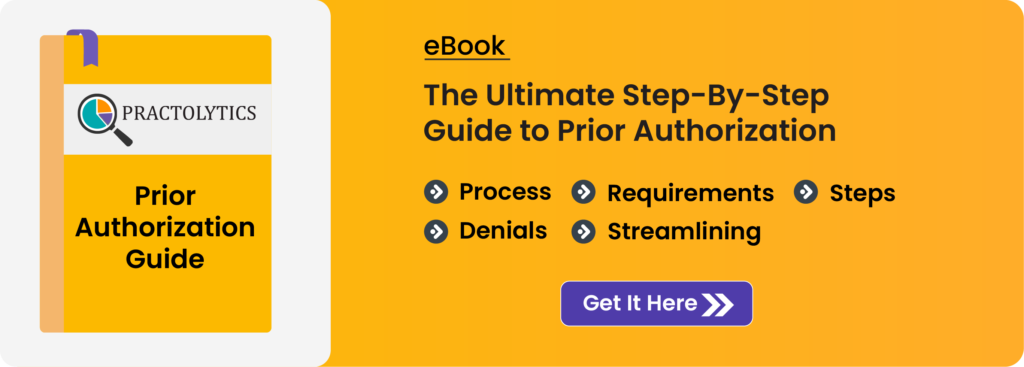Tapping into the Strength of Prior Authorization: Paving the Way for Healthcare Revenue Triumph
Within the intricate landscape of healthcare Revenue Cycle Management (RCM), “Prior Authorization” frequently remains in the shadows, yet it plays a significant role in facilitating seamless and effective revenue generation. While RCM encompasses a wide range of financial management activities in healthcare, Prior Authorization holds a central position. In this blog, we will delve into the realm of Prior Authorization, examining its procedures and the option of outsourcing, illuminating its critical function within the healthcare revenue cycle.
Table of Contents
What is Prior Authorization?
Prior Authorization, often abbreviated as PA, is a crucial element of the healthcare system, serving a pivotal role in guaranteeing appropriate and cost-effective medical care. This procedure necessitates healthcare providers to secure consent from an insurance company or payer before administering specific medical treatments, procedures, medications, or tests to a patient.
The primary aim of prior authorization is to assess the medical necessity and suitability of a proposed healthcare service. Its purpose is to prevent unnecessary procedures, tests, or treatments that could lead to inflated healthcare costs and potential patient risks. Moreover, it also assists in managing the use of high-cost medications or treatments, ensuring that patients receive the most appropriate and cost-effective alternatives whenever feasible.
Healthcare providers, including doctors, hospitals, and pharmacies, bear the responsibility of submitting prior authorization requests to insurance companies or payers. They must also furnish comprehensive clinical documentation to support the necessity of the proposed care. Following review, the payer will either approve or deny the request based on established criteria and guidelines.
Process of Prior Authorization in RCM
The process of Prior Authorization within Revenue Cycle Management (RCM) involves several intricate steps. Let’s dissect each of these stages to gain a better understanding of how Prior Authorization operates in the RCM framework:
- Confirming Patient Eligibility:
The initial step in the Prior Authorization process is to verify whether the patient qualifies for the proposed medical service or treatment. This verification ensures that the patient’s insurance coverage is active and that the specific service is covered under their plan.
- Assessing Medical Necessity:
Once eligibility is confirmed, the next critical step is to evaluate the medical necessity of the proposed service or treatment. This entails a thorough examination of the patient’s medical records and the healthcare provider’s recommendation to determine if the requested procedure is essential for the patient’s health.
- Verifying Insurance Benefits:
After establishing medical necessity, the RCM team must review the patient’s insurance benefits to determine the extent of coverage for the suggested service. This includes identifying co-pays, deductibles, or other costs for which the patient is responsible.
- Completing the Prior Authorization Request:
Armed with all the necessary information, the RCM team then fills out the Prior Authorization request form. This form typically includes details about the patient’s condition, the healthcare provider, the recommended service, and a medical justification for the procedure.
- Submitting to the Insurance Provider:
Once the PA request is correctly filled out, it is submitted to the patient’s healthcare insurance provider. The request undergoes a review by the insurance company to ensure its validity and adherence to their policies.
- Follow-Up and Appeals:
In many cases, insurance providers may initially reject a PA request, necessitating a follow-up process where additional information or documentation may be provided to appeal the denial. RCM teams must persistently advocate for the approval of necessary procedures.
- Authorization and Scheduling:
Upon approval from the insurance provider, Prior Authorization is granted, allowing the healthcare provider to proceed with scheduling and administering the recommended medical service or treatment.
- Billing and Claims Submission:
Following the completion of the authorized service, the RCM team generates a claim for reimbursement, which is then submitted to the insurance company. Accurate billing is crucial to ensure timely reimbursement and revenue collection.
- Payment and Denial Management:
Once the insurance provider processes the claim, payments are received, and any denials or discrepancies must be promptly addressed. Effective denial management is vital to optimize revenue in the healthcare revenue cycle.
Outsourcing Prior Authorization
Outsourcing Prior Authorization has become an attractive option for healthcare organizations due to the complexities and time-consuming nature of the process. This approach offers several benefits that can enhance the efficiency of revenue cycle management:
- Access to Expertise and Efficiency:
Outsourcing Prior Authorization to specialized service providers ensures that experienced professionals manage the process. These experts are knowledgeable about insurance regulations and can efficiently navigate the complexities of Prior Authorization.
- Cost Savings:
Healthcare organizations can reduce operational costs associated with in-house Prior Authorization teams by outsourcing. This includes expenses related to hiring, training, and retaining skilled staff.
- Faster Turnaround Times:
Outsourcing companies often have streamlined processes and dedicated resources, enabling them to secure Prior Authorizations more rapidly. This results in reduced waiting times for patients and faster revenue collection for healthcare providers.
- Increased Revenue Collection:
Efficient Prior Authorization processes lead to fewer denials and rejections. Outsourcing companies have the expertise to submit well-documented requests, minimizing the chances of denial and optimizing revenue collection.
- Focus on Core Competencies:
Outsourcing Prior Authorization allows healthcare organizations to redirect their in-house resources and staff toward delivering quality patient care and other core functions, ultimately improving overall patient satisfaction.
- Compliance and Risk Mitigation:
Outsourcing companies are often well-versed in healthcare compliance and risk management, reducing the chances of costly errors or regulatory violations. This ensures that the Prior Authorization process remains in line with industry regulations and standards.
In short, Prior Authorization plays a crucial role in the management of healthcare revenue cycles, ensuring the appropriate utilization of medical services while optimizing revenue collection. Having a deep understanding of the intricacies of the Prior Authorization process, spanning from eligibility verification to claims submission, is imperative for healthcare providers.
Furthermore, the choice to outsource Prior Authorization can bring substantial advantages to healthcare organizations, enhancing efficiency, cutting costs, and bolstering revenue collection. In the evolving landscape of healthcare, Prior Authorization remains a cornerstone in achieving financial stability and delivering high-quality care to patients.
Integrating Prior Authorization seamlessly into the revenue cycle management process represents not just a strategic decision but also a dedication to refining healthcare operations within an ever-changing industry.
Experience the seamless world of Prior Authorization unlocking with Practolytics!
We excel in simplifying the authorization process, saving you time, and ensuring swift approval.
Our team of experts comprehends the complexities of prior authorization and dedicates themselves to meeting all the necessary requirements for your requests. Bid farewell to paperwork and extended waiting times. Embrace efficiency!
Don’t allow authorization challenges to impede your progress. Opt for Practolytics, your reliable companion for a streamlined prior authorization process. To learn more, get in touch with us at +(803) 932-9624 or reach out via email at [email protected].
ALSO READ – The Perks of Outsourcing Prior Authorization Services
Talk to Medical Billing Expert Today — Get a Free Demo Now!






